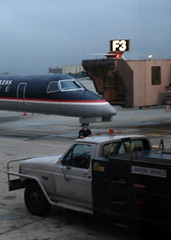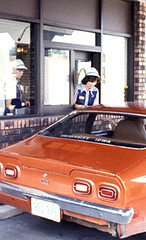You can always tell the true quality of a company by how it handles a crisis, big or small. I learned a lot about US Airways, which became the fifth largest carrier in the United States after merging with America West this year, while I was stranded in Philadelphia on my way to New Haven, Conn. last Thursday.
At least 20 flights were cancelled for “weather” and US Airways in Philadelphia quickly buckled under the strain of wayward passengers. It didn’t help that the customer service line was staffed by only two or three people to assist a line that spanned several city blocks.
Adding to the confusion was one US Airways passenger service agent who, instead of assisting passengers, attempted to convince them to get out of line and rebook their own flights by calling a 1-800 number.
“I’m not telling you what to do,” he crowed, attempting to relieve himself of any and all accountability. “I’m telling you what I would do.”
But then he would return every few minutes, berating those passengers who took down the 1-800 number in desperation or politeness but were still unwilling to relinquish their position. (Some didn’t leave the line, simply because the agent lacked credibility.)
For me, there was only one reason to stay. While leaving Las Vegas, the Transportation Security Administration agents had mishandled the tray that contained all of my personal electronics. While my laptop and camera survived, my cell phone was less fortunate — split at the seam, with all audio functions rendered inoperable. Text messaging my way out of being stranded proved futile beyond notifying those expecting me that I might not make it.
As it turned out, staying in line for more than 4 and a half hours proved to be the wiser decision anyway. I was given a new boarding pass, allowing me to enter or leave the airport (other passengers were less fortunate the next morning). And, while waiting in line, the airlines had booked me on what they said was the next available flight to New Haven (about 9:30 a.m. the next morning), arranging for my baggage to be checked through on the same flight.
I also to learned that all the airport hotels were booked full, making it futile to do as the agent suggested. So rather than spending the night at the very accommodating Omni New Haven Hotel at Yale as planned, I would be semi-sleeping in Terminal F at the Philadelphia International Airport.
“If I were you, I would give up on alternative flights and make plans to stay in Philadelphia,” the customer service agent had said. “Get out of line, get your bags at baggage claim, and find a hotel. You’re not going anywhere tonight and there are no guarantees that you’ll be getting out tomorrow either.”
There was another benefit to not listening to him or several other customer service agents who may have had the façade of knowing what to do, but proved just as confused as the passengers.
The 1-800 number they handed out was overloaded with calls and frequently disconnected. If you did get through, there was a possibility you would override your status on the next available flight. And, there was another 4-hour mass of people attempting to retrieve their bags in baggage claim, ranging from parents who ran out of formula to seniors who packed enough medication for a delay but not enough for what could be a day or two.
Even more perplexing was the sheer lack of empathy for passengers. Some service agents taunted them with looks of amusement, noting to each other that they would be headed home in an hour or thank goodness they had to check in departing flights that were apparently unhindered by “weather.”
Given that 34.14 percent of all America West dba US Airways flights were delayed and 2.29 percent were cancelled in 1997 (39.07 percent delayed and 3.08 percent in Philadelphia), weather is often the explanation for the airline, but seldom the cause. More likely, US Airways has adopted the America West approach to air travel, which means it lands and takes off at the airport as “space is available.”
In fact, the US Airways crew was so used to delays and cancelled flights, they handed a pre-written letter to passengers after the first three hours. While it might have read “Once again, we wish to extend you our sincere apology, and trust that you will consider the unforeseen nature of the cause of this travel interruption and understand our team will work as quickly as possible to assist you with your new travel plans,” the real message was the medium: it was a fifth generation photocopy with a 1-800 number written in by hand. It also said, though not in writing, don’t expect credit, hotel accommodations, or meal per diem tonight.
I did not, but what I did expect was some semblance of customer service. And since US Airways seems incapable of mapping out an appropriate plan of action when such instances occur almost 40 percent of the time, I’ll post what they could have done tomorrow as well as how I, as a passenger stranded overnight in an airport, managed to avoid succumbing to the chaos and growing negativity caused by not the passengers as much as US Airways personnel.
Yes, I managed to maintain a smile even when my luggage wasn't waiting at the New Haven baggage claim as promised. My cousin's wedding, the only reason to be in New Haven after everything other reason had to be cancelled, was now only six hours away.

At least 20 flights were cancelled for “weather” and US Airways in Philadelphia quickly buckled under the strain of wayward passengers. It didn’t help that the customer service line was staffed by only two or three people to assist a line that spanned several city blocks.
Adding to the confusion was one US Airways passenger service agent who, instead of assisting passengers, attempted to convince them to get out of line and rebook their own flights by calling a 1-800 number.
“I’m not telling you what to do,” he crowed, attempting to relieve himself of any and all accountability. “I’m telling you what I would do.”
But then he would return every few minutes, berating those passengers who took down the 1-800 number in desperation or politeness but were still unwilling to relinquish their position. (Some didn’t leave the line, simply because the agent lacked credibility.)
For me, there was only one reason to stay. While leaving Las Vegas, the Transportation Security Administration agents had mishandled the tray that contained all of my personal electronics. While my laptop and camera survived, my cell phone was less fortunate — split at the seam, with all audio functions rendered inoperable. Text messaging my way out of being stranded proved futile beyond notifying those expecting me that I might not make it.
As it turned out, staying in line for more than 4 and a half hours proved to be the wiser decision anyway. I was given a new boarding pass, allowing me to enter or leave the airport (other passengers were less fortunate the next morning). And, while waiting in line, the airlines had booked me on what they said was the next available flight to New Haven (about 9:30 a.m. the next morning), arranging for my baggage to be checked through on the same flight.
I also to learned that all the airport hotels were booked full, making it futile to do as the agent suggested. So rather than spending the night at the very accommodating Omni New Haven Hotel at Yale as planned, I would be semi-sleeping in Terminal F at the Philadelphia International Airport.
“If I were you, I would give up on alternative flights and make plans to stay in Philadelphia,” the customer service agent had said. “Get out of line, get your bags at baggage claim, and find a hotel. You’re not going anywhere tonight and there are no guarantees that you’ll be getting out tomorrow either.”
There was another benefit to not listening to him or several other customer service agents who may have had the façade of knowing what to do, but proved just as confused as the passengers.
The 1-800 number they handed out was overloaded with calls and frequently disconnected. If you did get through, there was a possibility you would override your status on the next available flight. And, there was another 4-hour mass of people attempting to retrieve their bags in baggage claim, ranging from parents who ran out of formula to seniors who packed enough medication for a delay but not enough for what could be a day or two.
Even more perplexing was the sheer lack of empathy for passengers. Some service agents taunted them with looks of amusement, noting to each other that they would be headed home in an hour or thank goodness they had to check in departing flights that were apparently unhindered by “weather.”
Given that 34.14 percent of all America West dba US Airways flights were delayed and 2.29 percent were cancelled in 1997 (39.07 percent delayed and 3.08 percent in Philadelphia), weather is often the explanation for the airline, but seldom the cause. More likely, US Airways has adopted the America West approach to air travel, which means it lands and takes off at the airport as “space is available.”
In fact, the US Airways crew was so used to delays and cancelled flights, they handed a pre-written letter to passengers after the first three hours. While it might have read “Once again, we wish to extend you our sincere apology, and trust that you will consider the unforeseen nature of the cause of this travel interruption and understand our team will work as quickly as possible to assist you with your new travel plans,” the real message was the medium: it was a fifth generation photocopy with a 1-800 number written in by hand. It also said, though not in writing, don’t expect credit, hotel accommodations, or meal per diem tonight.
I did not, but what I did expect was some semblance of customer service. And since US Airways seems incapable of mapping out an appropriate plan of action when such instances occur almost 40 percent of the time, I’ll post what they could have done tomorrow as well as how I, as a passenger stranded overnight in an airport, managed to avoid succumbing to the chaos and growing negativity caused by not the passengers as much as US Airways personnel.
Yes, I managed to maintain a smile even when my luggage wasn't waiting at the New Haven baggage claim as promised. My cousin's wedding, the only reason to be in New Haven after everything other reason had to be cancelled, was now only six hours away.














